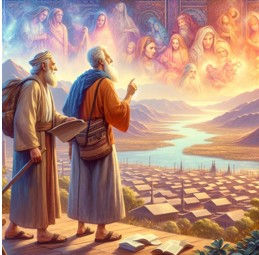Reflection by The Rev'd Dr Deborah Broome
- Nov 12, 2025
- 3 min read

A vision of the future
For I am about to create new heavens and a new earth; the former things shall not be remembered or come to mind. But be glad and rejoice forever in what I am creating, for I am about to create Jerusalem as a joy and its people as a delight. I will rejoice in Jerusalem and delight in my people; no more shall the sound of weeping be heard in it or the cry of distress. No more shall there be in it an infant who lives but a few days or an old person who does not live out a lifetime, for one who dies at a hundred years will be considered a youth, and one who falls short of a hundred will be considered accursed. They shall build houses and inhabit them; they shall plant vineyards and eat their fruit. They shall not build and another inhabit; they shall not plant and another eat, for like the days of a tree shall the days of my people be, and my chosen shall long enjoy the work of their hands. They shall not labour in vain or bear children for calamity, for they shall be offspring blessed by the Lord— and their descendants as well. Before they call I will answer, while they are yet speaking I will hear. The wolf and the lamb shall feed together; the lion shall eat straw like the ox, but the serpent—its food shall be dust! They shall not hurt or destroy on all my holy mountain, says the Lord. (Isaiah 65:17-25)
Isaiah here is writing to people who had returned to Jerusalem from exile in Babylon. This offers a powerful vision of hope: God is creating a new heavens and a new earth. It looks ahead to a time when God will renew all things – to a future not of destruction, but of restoration. The prophet imagines a world where sorrow is replaced by joy, where life is long and fruitful, and where peace reigns. The sort of world we’d like to live it.
This is about the restoration of all of God’s creation to the wholeness intended for it at the very beginning. The joy and delight of Jerusalem and its people won’t be just human happiness but divine joy in the restored relationship between God and God’s people. Life will be valued and protected: no longer will babies live only a few days or the elderly fail to reach fullness of life. Economic justice and dignity will prevail as people enjoy the results of their own labour. The final image of the wolf and the lamb feeding together looks back to the harmony of the original Eden where natural enemies lived together peacefully.
This is an invitation into God’s future, which is radically different from the brokenness of the world at present. This is what God wants to do, for us and with us. We’re invited to imagine how it can be, and then live now in ways that anticipate this “new heavens and new earth.” This is living with hope (not escapism), living out a commitment to the transforming work of God. There’s a strand running through all this coming Sunday’s readings: this is what the future looks like; it’s not here yet – so how do we live while we are waiting for it?



Comments